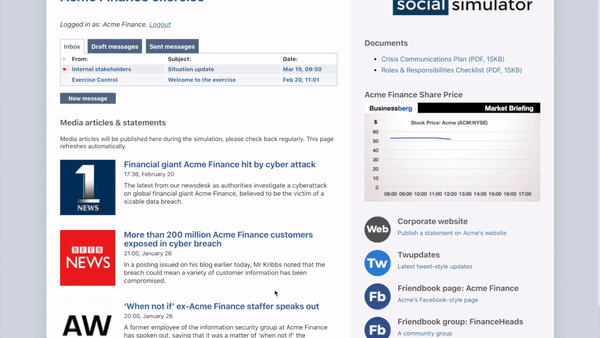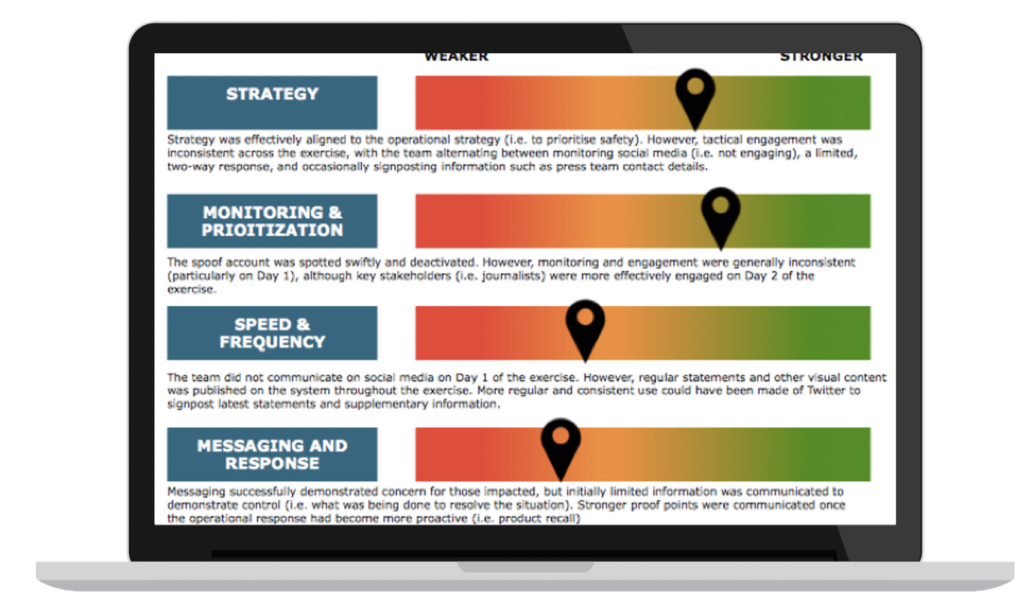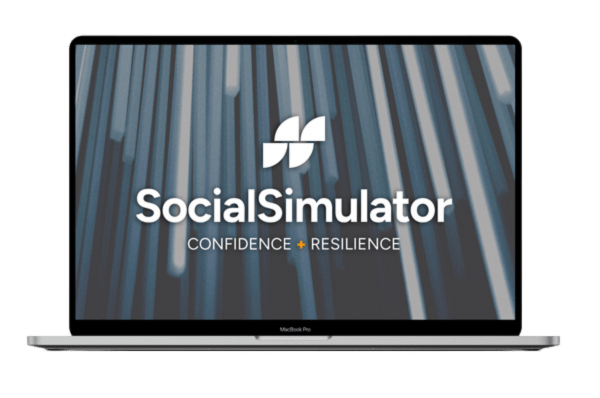Our platform delivers simulated media articles, broadcast news, social media channels, emails, and websites to create a safe yet challenging crisis scenario. Throughout the evolving situation, your team will assign roles and formulate appropriate responses, enhancing their skills in real-time. Operating from an adjacent room or remotely, the Social Simulator team manages the exercise platform, intelligently adapting the script to apply just the right amount of pressure on your team.
Simulate incidents and issues worldwide
Bring highly-realistic situations to life for your team, playing out across the media channels and social media influencers that feel credible in their region and sectorRun virtual or co-located simulations
Virtual, on-site or hybrid exercises: Social Simulator is secure, tried and tested for any type of exercise, integrated smoothly alongside your preferred video conferencing toolDraw on flexible scenarios and support
Our team can help shape, script and deliver a powerful learning experience for your team, or slot in a scenario you develop and support you to bring it to lifeWhat is a simulation like?
Social Simulator creates an environment that looks, feels and responds like a real world event.
Ahead of time, we work with you to shape a challenging, realistic scenario based on real-world issues/risks, including simulated media reports, emails, calls, social media posts and imagery.
We prepare powerful exercise injects, from green-screen news bulletin videos to mock memes and influencer posts.
On the day, we’re generally in teams, physically or virtually together, comprising participants, observers and exercise controllers.
Participants will face incoming social media, phone calls, emails and media articles and need to assign roles and develop an appropriate response.
Simulations typically last around 3 hours with an initial briefing and ‘hot’ debrief immediately afterwards to capture lessons learned and give feedback.


What kind of feedback do participants get?
Typically we have a ‘hot debrief’ at the end of the exercise to share feedback on strengths and areas for improvement in the team’s response.
We provide copies of all the exercise materials and can supplement this with a summary benchmarking report to help you understand gaps and priority areas for further training or angles for subsequent exercises.
Rich social & media replicas
Simulations feel real thanks to our library of over 1,000 media brands and social media replicas of X, TikTok, Facebook, Instagram, YouTube, LinkedIn, forums, chat and social intranetsPlans, templates and third party tools
Exercises can seamlessly incorporate your crisis plan templates or checklists and work smoothly alongside your in-house tools for collaboration, incident management or messagingTeam email messaging
Individual or team inboxes with attachments make it easy to target injects at different roles in the team - and monitor how the team works without anything going astrayStock price movement or system status
Simulate movements in share price, departure boards, oil spill trajectories or custom control panels - whatever the team needs to make decisionsReal social media pressure
Alongside roleplayers keep up the pressure from customers and critics on social media channels, giving even the strongest customer comms teams a challengeWhite label option for agencies
We work with the world's leading communications agencies and management consultancies to help them test their clients' crisis preparedness, under custom branding on a white-label basisHow could we help you?
We’re happy to set up a demo to show you how Social Simulator works and talk through how it can bring training to life: email [email protected]


